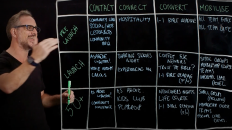(Other posts in this series: Part 1, Part 3, Part 4, Part 5, Part 6)
This post and the next one should really have gone first, because they are the most basic. But sometimes basic stuff is boring, and so it’s nice to begin with something juicier. Think of these posts as a flashback sequence 🙂
I was talking to someone who works deep within the University of Tasmania, about the process of accountability, measurement, accreditation and how burdensome it can all become: you spend so much time filling out forms trying to account for what you are doing, and then no one has the time to read them anyway. But then this person wisely observed:
“But in another way, the very act of thinking about what you are doing in a disciplined way is very valuable.”
I think the same holds true with ministry. When you problem solve or develop a strategy, it can be hard to know whether the strategy worked because it was the ‘right’ strategy, or whether the simple act of thinking about what you do in a careful and disciplined manner about what you do had its own positive spinoffs.
Think carefully and consistently about your ministry
So with ministry models and fads and philosophies: they might be valuable because they prompt you and your team to think carefully and deeply and throughly about your ministry. They may simply be a thought model to help you do the thinking. This is a good thing, whether you are using the framework of 5Ms or 5 Dysfunctions of a Sticky Church.
The other advantage of a model, is that if you ‘buy into it’ it may encourage you to follow through. Bits and pieces of ideas can be bolted on haphazardly and then abandoned at whim. But if you adopt a model, you may have a bit of extra motivation to ‘work the model’.
And once again, consistency is often a very effective and powerful thing, no matter than model.
Beware of sloppiness and inconsistency
The opposite is also true. Even if you adopt the 5Ms or whatever strategy some great church is using… if you adopt it in a sloppy, undisciplined, superficial manner, and fail to grasp it deeply don’t expect much benefit. If you don’t spend time prayerfully and theologically digesting the model and how it would work out in your context, don’t think it’ll fly.
And, likewise, if you are not going to give it patience and care and time, don’t blame the model. Slow, deliberate, thoughtful implementation, and then perseverance and steadiness are needed for most things to really flourish. Don’t try it for a year or two and then say ‘It doesn’t work here’.



